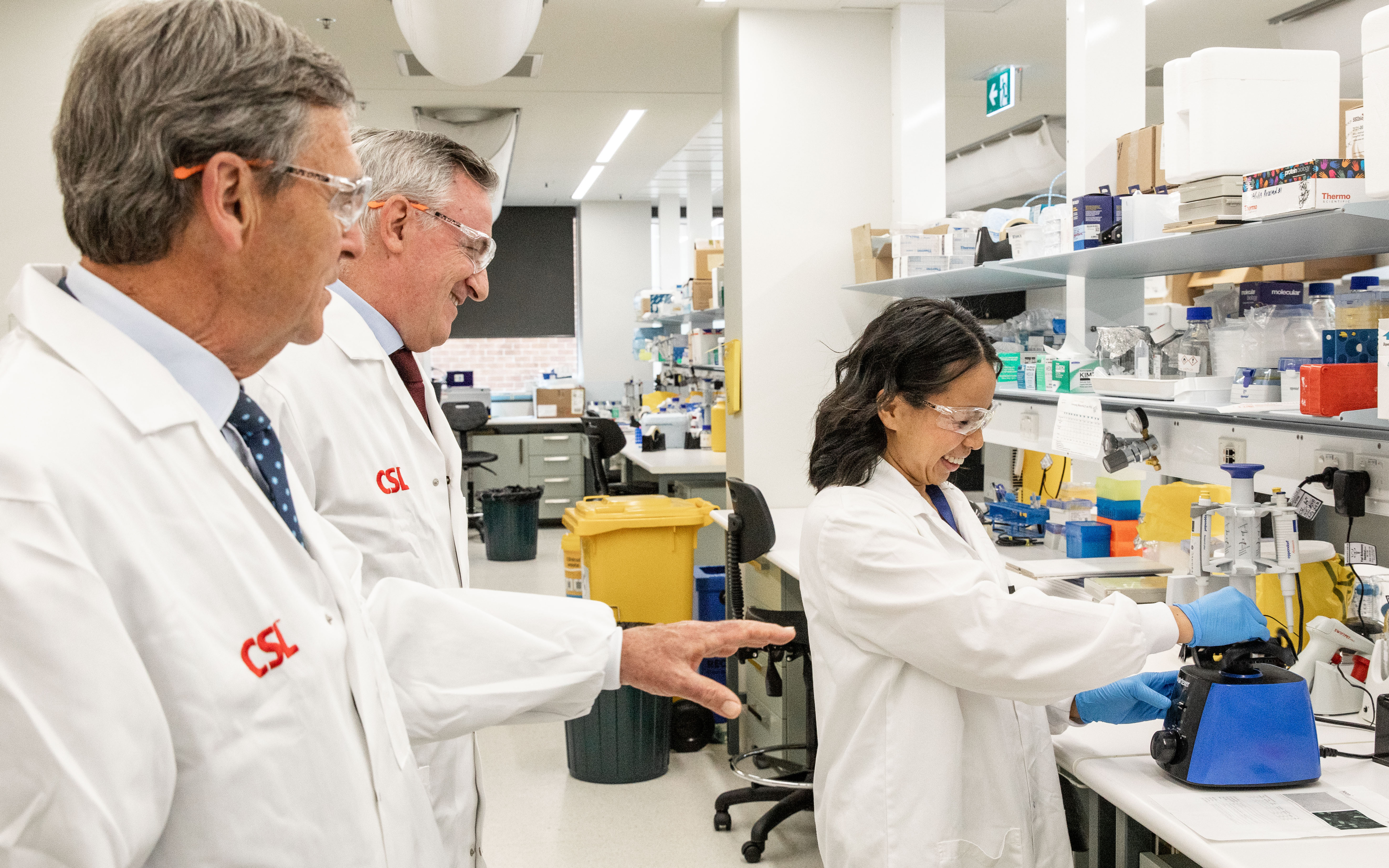Breakthrough Victoria invests in new Biotech Incubator in Melbourne’s Biomedical Precinct
Victoria has taken another giant step towards becoming one of the great globally recognised hubs for biotechnology development and commercialisation with the announcement of a new incubator to be established in Melbourne.
The incubator, the first project to receive funding from Breakthrough Victoria, is the brainchild of a consortium of CSL, the University of Melbourne and Walter and Eliza Hall Institute for Medical Research (WEHI)and will be located within the Melbourne Biomedical Precinct.
It will offer biotech start-ups the infrastructure and ecosystem necessary to progress from the lab to commercialisation, offering unparalleled access to industry expertise, academic and clinical facilities and capital.
Breakthrough Victoria CEO Grant Dooley said the new project, when completed in 2023, would have the capacity to provide facilities and expertise for up to 40 biotech start-up companies at a time.
“This is Breakthrough Victoria’s inaugural investment. This project aims to provide a sustainable asset for decades by providing a catalyst to progress ideas to commercial outcomes,” Mr Dooley said.
“Breakthrough Victoria exists to support innovations that will enable industries to create sovereign capability and local jobs by mobilising local intellectual property for the good of Victoria.”
With initial investment from Breakthrough Victoria of $25 million, the biotech incubator will be supported by additional cash and in-kind contributions from partners, CSL, WEHI and the University of Melbourne of approximately $45 million over ten years.
The incubator will capitalise on the infrastructure investments already made in the precinct, known as the Parkville National Employment and Innovation Cluster (NEIC), which includes 30 world-class hospitals, medical research institutes and universities and is home to CSL’s global headquarters.
To be located across two floors of CSL’s new global corporate headquarters being built in the Melbourne Biomedical Precinct, the incubator will have one floor of purpose-built wet lab space and another for office space and meeting rooms.
CSL’s Chief Scientific Officer Dr Andrew Nash said incubator residents would have access to the support, networking, mentoring and training needed to commercialise their ideas.
As the first and only incubator in Australia, co-located with a leading biopharmaceutical company, residents will benefit fromCSL’s onshore translational R&D expertise and capacity as they co-mingle with employees, Dr Nash said. “It will go a long way to addressing the barriers that hold back the commercialisation journey of many start up biotech companies, providing opportunities for cross-pollination, learning and sharing of ideas with industry experts –a hallmark of the best incubators around the globe.”
Intended residents at the incubator will include biotech scientists and supporting management teams in early discovery and pre-clinical development phases of research. WEHI and the University of Melbourne, both world leaders in biotech and health sciences, will offer start-ups at the incubator access to sophisticated technology platforms and expert technical support.
These platforms will include bioinformatics, electron microscopy, genome editing, histology, magnetic resonance, mass spectrometry, metabolomics, optical imaging, protein analysis, proteomics analysis, single cell and population-level genomics, and small drug discovery.
WEHI Director Professor Doug Hilton AO said the challenges that research scientists face when they spin-out a company or biomedical start-up include skill-gaps in translating their research into commercial products.“The Melbourne Biomedical Precinct is known for its internationally competitive, high-quality scientific outputs, but lags its global precinct peers when it comes to translating biotech inventions into spin-outs and commercial outcomes,” Professor Hilton said.“
This collaboration will help to build a generation of corporate and management-skilled scientists who have the knowledge and confidence to run a successful biomed or biotech company and raise the calibre and quantity of translational outputs from the precinct.”
The University of Melbourne Deputy Vice-Chancellor (Research) Professor Jim McCluskey said the University was delighted to be part of the team that conceived the incubator, believing it will become an important addition to the precinct.
“The creation of this Biotech Incubator builds on more than a century of collaboration between CSL, WEHI and The University of Melbourne. It brings together talent, investment and research expertise and will cement Australia’s reputation as leaders in biomedical education and research, working to improve the lives of many people around the world.
“Together, we can also tackle some of the critical issues faced by local biotech start-ups such as a lack of affordable infrastructure, barriers to commercialisation and funding opportunities.”
Initial research by the consortium indicated that incubation had been critical to the success of innovation clusters such as the MaRS Discovery District in Canada and Belgium’s VIB Bio-Incubator Ecosystem.
“Biotech incubators accelerate the pathway from ideation and research to commercialisation by providing affordable infrastructure and access to capabilities, capital, and communities that are essential to success,” said Mr Dooley.
This incubator will be the first of its kind in Australia - housed within the R&D engine of a global biopharmaceutical company. The incubator will support start-ups in their commercialisation journey by providing access to affordable state of the art wet-lab space and facilities, commercialisation training and mentoring, facilitated access to investors and service providers, all embedded within CSL’s global headquarters.
“Breakthrough Victoria’s investment alongside two of Australia’s pre-eminent scientific institutions, WEHI and the University of Melbourne, together with Australia’s largest biopharmaceutical company, CSL, will put Melbourne on the map as a globally recognised hub for biotech translation and commercialisation, complementing the precinct’s existing reputation for world-class medical research.”
The incubator is expected to be open for applications in 2023 and will help to create up to 300 jobs over its first 10 years.
Applications from start-ups will be sought from across Australia and internationally to attract the best and brightest to the Parkville Precinct. Start-ups interested in applying for residence in the incubator are encouraged to email hello@jumarbio.com
Watch the video here:
